CFP: Comprehending Comics – Exploring Methodologies and Approaches to Comic Studies in History and the Social Sciences
CFP: GSA Comics Studies Network
New Publication: „Figuren begegnen in Filmen und Comics“ (Encountering Characters in Films and Comics)
ComFor member Björn Hochschild’s dissertation, titled Figuren begegnen in Filmen und Comics (Encountering Characters in Films and Comics), has just been published as the 12th volume of the Cinepoetics series by De Gruyter. His book discusses existing neophenomenological film theory and presents a phenomenology of comics. Based on an interdisciplinary exchange of these theories, it develops a phenomenological method of character analysis. It demonstrates this in encounters with characters in films and comics by Chris Ware, Riad Sattouf, and Marc Forster.
The book is available in print and as open access (https://doi.org/10.1515/9783111198019).
eBook
ISBN: 9783111198019
Hardcover
ISBN: 9783111086958
Blurbs:
“How do we encounter characters in films and comics? While audiences might relate to characters intuitively, film and comics scholars cannot analyze them in the same intuitive way. Theories and analytical methods influenced by narratology and cognitive theory often conceptualize characters as finished subjects presented in a medial disguise. This study argues instead that film-watching and comic-reading are dynamic situations permeated by subjectivity. Conceptualized as film- or comic-behavior, these subjectivized dynamics form the basis for the emergence of characters for viewers and readers. The study develops a phenomenological theory and method that allows us to analyze encounters with characters through descriptions of film- and comic-behaviors. Drawing on Maurice Merleau-Ponty’s philosophy of perception, it discusses current phenomenological positions in film studies and articulates an extensive phenomenological framework for comic research. The works of Chris Ware, Riad Sattouf, and Marc Forster, which it discusses, are not only the subject of analytical case studies but also an integral part of this study’s theoretical framework.”
New Publication on Anke Feuchtenberger
The volume Die Königin Vontjanze: Kleiner Atlas zum Werk von Anke Feuchtenberger, edited by Ole Frahm and Andreas Stuhlmann and supported by ComFor, has just been published by Textem Verlag.
 292 pages
292 pages
23,00 Euro
Languages: German, Englisch
Design: Jan Schaab
16,5 x 23,5 cm
ISBN: 978-3-86485-303-6
Hamburg 2023
Publisher’s page
„Stets dem Experiment verpflichtet, immer mit einer klaren politischen, feministischen Haltung sind Anke Feuchtenbergers Zeichnungen prägend für mehrere Generationen von Comicautor*innen. Dieser Band ist eine Verbeugung vor ihrem Werk: Neben Comics umfasst es Zeichnung, Illustrationen, Bühnenbilder, Animationen, Plakate und vieles anderes mehr. In ihrer Lehre an der Hochschule für Angewandte Wissenschaften Hamburg hat sie in fünfundzwanzig Jahren maßgeblich das mitgestaltet, was heute im deutschen Sprachraum als Graphic Novel bekannt ist. Dieses Buch versammelt 40 Beiträge: Texte und Bilder ehemaliger Studierender, Kolleg*innen, Geisteswissenschaftler*innen und Fans. Ergänzt um ein ausführliches Gespräch mit und zahllose Bildbeispiele von Anke Feuchtenberger.”
New publication: “Superevil: Villains in Silver Age Superhero Comics”
The dissertation of ComFor-member Anke Marie Bock was recently published with Logos Verlag Berlin, sure to be relevant for future research:
 Superevil: Villains in Silver Age Superhero Comics
Superevil: Villains in Silver Age Superhero Comics
Anke Marie Bock
Logos Verlag Berlin
September 2023
ISBN 978-3-8325-5693-8
Publisher’s page
“Superevil: Villains in Silver Age Superhero Comics sheds light on the often-disregarded supervillains in the American superhero comic of the 1960s. From Loki to Killmonger – they all possess famous cinematic counterparts, yet it is their comic origin that this study examines. Not only did The Silver Age produce countless superheroes and supervillains who have conquered the screens in the last two decades, but it also created complex villains. Silver Age supervillains were, as the analyses in Superevil show, the main and only means to include political and societal criticism in a cultural product, which suffered from censorship and belittlement. Instead of focusing on the superheroes once more, Anke Marie Bock pioneers in putting the supervillain as such in the center of the attention. In addition to addressing the tendency to neglect villains in superhero-comic studies, revealing many important functions the supervillains fulfill, among them criticizing Cold War politics, racism, gender roles and the often unquestioned binary of good and evil on the examples of i.a. The Fantastic Four, Spider-Man and Black Panther comics.“
Monitor 75: New Publications on Comic Books
Monitor is an irregularly published overview of publications from the previous six months that may be of relevance to comics studies scholars. The introductory texts are the respective publishers’. Do you have suggestions or information on new releases that have been overlooked and should be introduced on our website? Please let us know via email: redaktion@comicgesellschaft.de.
→ See previous Monitor posts.
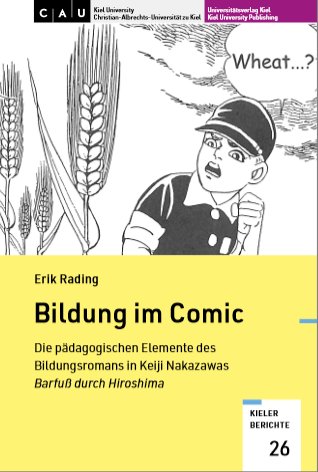 Bildung im Comic: Die pädagogischen Elemente des Bildungsromans in Keiji Nakazawas Barfuß durch Hiroshima
Bildung im Comic: Die pädagogischen Elemente des Bildungsromans in Keiji Nakazawas Barfuß durch Hiroshima
Kieler Berichte, Vol. 26
Erik Rading
Universitätsverlag Kiel
August 2023
Publisher’s website
“In den vergangenen Jahren wurden immer wieder Untersuchungen veröffentlicht, die sich der Frage widmeten, ob bestimmte Comics als Bildungsromane verstanden werden können. Trotz vermeintlich naheliegender Anschlusspunkte, z. B. der (literarischen) Auseinandersetzung mit lebensweltlichen Vorstellungen von Bildung, sucht man dabei eine pädagogische Perspektive weitestgehend vergebens. Dieser Leerstelle versucht sich der vorliegende Beitrag anzunehmen, indem er die Übertragung der pädagogischen Elemente des Bildungsromans auf den Comic untersucht. Dabei folgt er der Annahme, dass sich schon im Bildungsroman wie auch im Comic lebensweltliche, gesellschaftliche und historische Verständnisse pädagogische relevanter Themen und Intentionen, wie z. B. Bildung, Entwicklung oder Erziehung, artikulieren können, ohne dass diese Ansprüchen an explizit wissenschaftlich-pädagogische Theorien genügen müssen. Wie in den genannten Untersuchungen üblich, wird zur Bearbeitung dieses Forschungsanliegens ein Comic – hier die ersten vier Bände von Barfuß durch Hiroshima des japanischen Mangaka Keiji Nakazawa – als exemplarischer Forschungsgegenstand herangezogen und hermeneutisch nach den pädagogisch relevanten Elementen des Bildungsromans analysiert. Im Zuge dessen werden – entsprechend dem methodischen Vorgehen – Überlegungen zu einer spezifischen Hermeneutik des Comics präsentiert, der bisher als Erzählform kaum Berücksichtigung in methodologisch-hermeneutischen Überlegungen fand.”
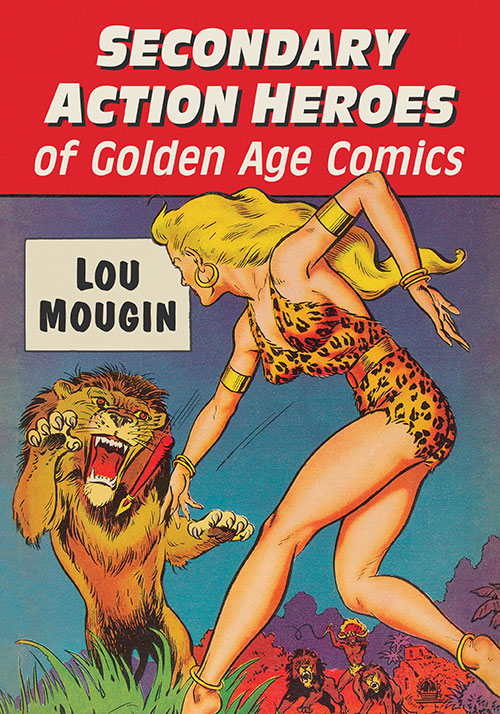
Secondary Action Heroes of Golden Age Comics
Lou Mougin
McFarland
August 2023
Publisher’s website
“The 1940s saw the birth of many enduring superheroes like Superman, Batman, Captain America and Captain Marvel. Outside of the superhero genre, the golden age of comics also featured a host of lesser-known, evil-fighting action figures, and this book contains a wealth of information about these heroes without capes. Covered here are jungle heroines like Sheena, Rulah and Princess Pantha; science fiction stalwarts including Spacehawk, Hunt Bowman and Futura; adventurers such as Kayo Kirby, Werewolf Hunter and Senorita Rio; and Western heroes ranging from Tom Mix to the Ghost Rider.”
 Comics and Migration: Representation and Other Practices
Comics and Migration: Representation and Other Practices
Global Perspectives in Comics Studies
Ralf Kauranen, Olli Löytty, Aura Nikkilä, Anna Vuorinne (Eds.)
Routledge
2023
Publisher’s website
“Comics and human mobility have a long history of connections. This volume explores these entanglements with a focus on both how comics represent migration and what applied uses comics have in relation to migration. The volume examines both individual works of comic art and examples of practical applications of comics from across the world.
Comics are well-suited to create understanding, highlight truthful information, and engender empathy in their audiences, but are also an art form that is preconditioned or even limited by its representational and practical conventions. Through analyses of various practices and representations, this book questions the uncritical belief in the capacity of comics, assesses their potential to represent stories of exile and immigration with compassion, and discusses how xenophobia and nationalism are both reinforced and questioned in comics. The book includes essays by both researchers and practitioners such as activists and journalists whose work has combined a focus on comics and migration. It predominantly scrutinises comics and activities from more peripheral areas such as the Nordic region, the German-language countries, Latin America, and southern Asia to analyse the treatment and visual representation of migration in these regions.”
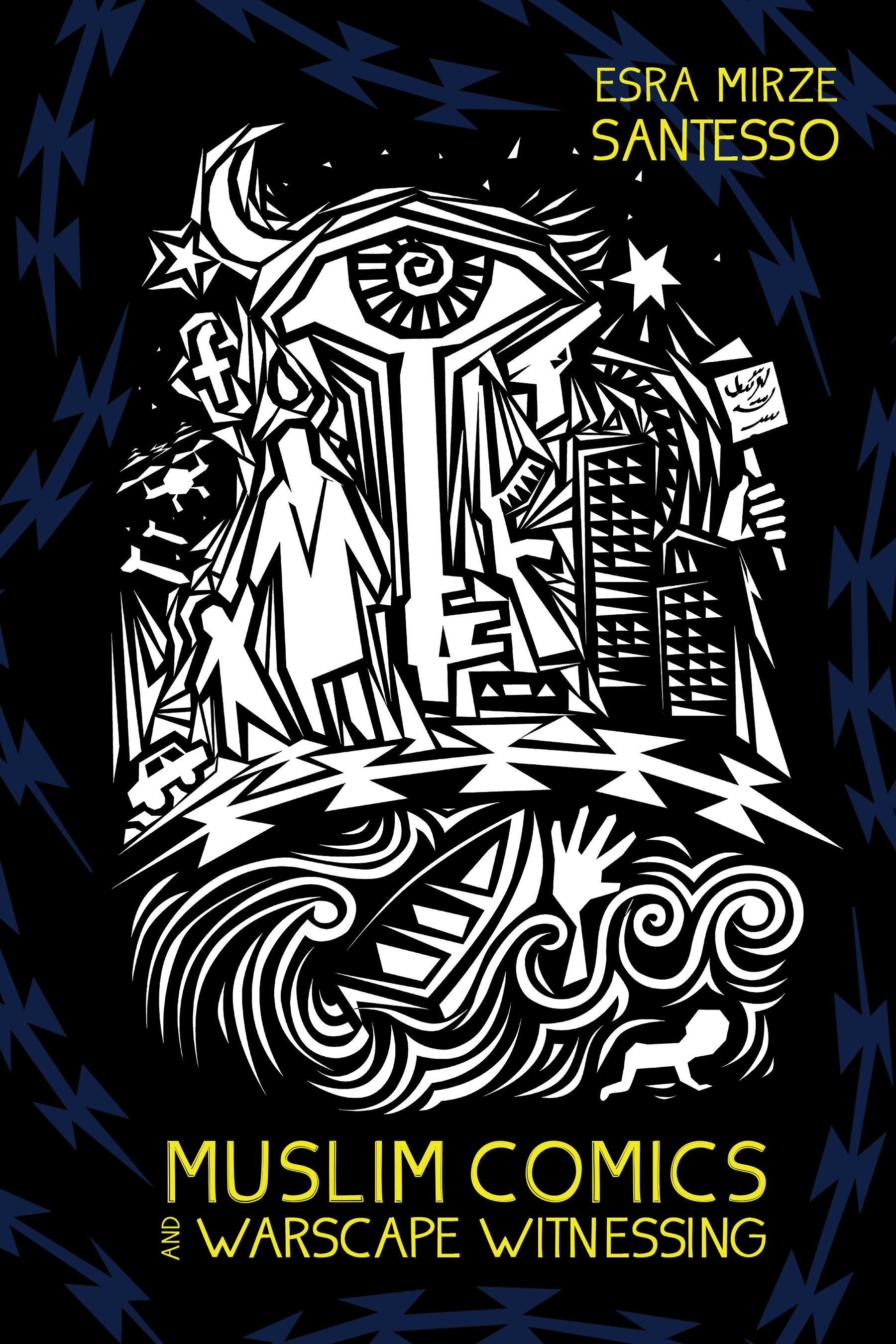 Muslim Comics and Warscape Witnessing
Muslim Comics and Warscape Witnessing
Studies in Comics and Cartoons
Esra Mirze Santesso
Ohio State University Press
September 2023
Publisher’s website
“Recent decades have seen an unprecedented number of comics by and about Muslim people enter the global market. Now, Muslim Comics and Warscape Witnessing offers the first major study of these works. Esra Mirze Santesso assesses Muslim comics to illustrate the multifaceted nature of seeing and representing daily lives within and outside of the homeland. Focusing on contemporary graphic narratives that are primarily but not exclusively from the Middle East—from blockbusters like Marjane Satrapi’s Persepolis to more local efforts such as Leila Abdelrazaq’s Baddawi—Santesso explores why the graphic form has become a popular and useful medium for articulating Muslim subjectivities. Further, she shows how Muslim comics “bear witness” to a range of faith-based positions that complicate discussions of global ummah or community, contest monolithic depictions of Muslims, and question the Islamist valorization of the shaheed, the “martyr” figure regarded as the ideal religious witness. By presenting varied depictions of everyday lives of Muslims navigating violence and militarization, this book reveals the connections between religious rituals and existence in warscapes and invites us to more deeply consider the nature of witnessing itself.”
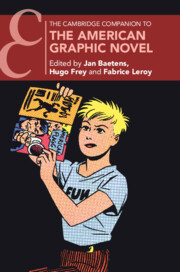 The Cambridge Companion to the American Graphic Novel
The Cambridge Companion to the American Graphic Novel
Cambridge Companions to Literature
Jan Baetens, Hugo Frey, Fabrice Leroy (Eds.)
Cambridge University Press
September 2023
Publisher’s website
“The Cambridge Companion to the American Graphic Novel explores the important role of the graphic novel in reflecting American society and in the shaping of the American imagination. Using key examples, this volume reviews the historical development of various subgenres within the graphic novel tradition and examines how graphic novelists have created multiple and different accounts of the American experience, including that of African American, Asian American, Jewish, Latinx, and LGBTQ+ communities. Reading the American graphic novel opens a debate on how major works have changed the idea of America from that once found in the quintessential action or superhero comics to show new, different, intimate accounts of historical change as well as social and individual, personal experience. It guides readers through the theoretical text-image scholarship to explain the meaning of the complex borderlines between graphic novels, comics, newspaper strips, caricature, literature, and art.”

Ilan Manouach in Review: Critical Approaches to his Conceptual Comics
Pedro Moura (Ed.)
Routledge
September 2023
Publisher’s website
“This book takes an interdisciplinary and diverse critical look at the work of comic artist Ilan Manouach, situating it within the avant-garde movement more broadly.
An international team of authors engages with the topic from diverse theoretical approaches, from traditional narratology and aesthetic close readings of some of Manouach’s books, engaging with comics’ own distinctive history, modes of production, circulation and reception, to perspectives from disability studies, post-colonial studies, technological criticism, media ecology, ontography, posthumanist philosophy, and issues of materiality and media specificity.
This innovative and timely volume will interest students and scholars of comic studies, media studies, media ecology, literature, cultural studies, and visual studies.”

Batman’s Villains and Villainesses: Multidisciplinary Perspectives on Arkham’s Souls*
Justin F. Martin, Marco Favaro (Eds.)
Lexington Books
September 2023
Publisher’s website
“While much of the scholarship on superhero narratives has focused on the heroes themselves, Batman’s Villains and Villainesses: Multidisciplinary Perspectives on Arkham’s Souls takes into view the depiction of the villains and their lives, arguing that they often function as proxies for larger societal and philosophical themes. Approaching Gotham’s villains from a number of disciplinary backgrounds, the essays in this collection highlight how the villains’ multifaceted backgrounds, experiences, motivations, and behaviors allow for in-depth character analysis across varying levels of social life. Through investigating their cultural and scholarly relevance across the humanities and social sciences, the volume encourages both thoughtful reflection on the relationship between individuals and their social contexts and the use of villains (inside and outside of Gotham) as subjects of pedagogical and scholarly inquiry.”
*The ComFor editorial board regrets the lack of diversity in this publication. We endeavour to cover the entire spectrum of comics studies, report in a neutral way and keep the editorial selection process to a minimum. But we are also aware of the problematic structures that shape our academic research environment and that frequently lead to a lower visibility of female comics scholars as well as those with marginalised identities in general. We know that this imbalance is often not intended by the editors / organisers and we do not want to imply this in any way. But nonetheless, we would like to draw attention to it to raise awareness for this problem.
18th ComFor Annual Conference 2023: „What was, is, becomes comics studies – for us?“
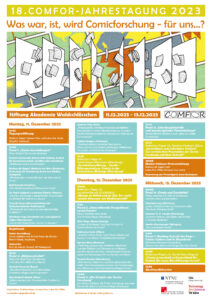 From December 11-13, 2023, the 18th annual conference of the Society for Comics Studies (ComFor) will take place at the Stiftung Akademie Waldschlösschen in 37130 Gleichen. The event will be organized by Christina Meyer, Vanessa Ossa, and Lukas R.A. Wilde.
From December 11-13, 2023, the 18th annual conference of the Society for Comics Studies (ComFor) will take place at the Stiftung Akademie Waldschlösschen in 37130 Gleichen. The event will be organized by Christina Meyer, Vanessa Ossa, and Lukas R.A. Wilde.
On the occasion of ComFor’s upcoming tenth anniversary as a registered association, this timespan will be subject to a critical reflection: How has comics studies developed and changed over the past ten years? Which recurring, but also new questions and research perspectives have we been dealing with since 2014? Which disciplinary shortcomings or desiderata do we need to address more precisely together in the future? „What was, is, becomes comics studies – for us?“ quite literally addresses our institution as well as the biographically shaped perspectives of our participating members.
Individual seats to participate in the lectures and panel discussions are still available, inquiries can be sent informally to vorstand@comicgesellschaft.de.